Looking to turn your passion for music into a profitable side gig? Becoming an event DJ might be the perfect opportunity for you.
This exciting career path allows you to showcase your talent while entertaining crowds at various gatherings.
Plus, with flexible hours and the potential for lucrative earnings, you can’t go wrong.
As an event DJ, you could earn between $500 and $1,500 per gig, depending on factors like location, experience, and event type. Starting as a side hustle, you can gradually build your reputation and client base while maintaining your day job.
From weddings to corporate functions, the demand for skilled DJs who can read a room and keep the dance floor packed is always present.
To kickstart your DJ side hustle, you’ll need to invest in quality equipment, develop your music selection and mixing skills, and create a strong online presence.
As you gain experience and positive reviews, you can expand your services and increase your rates.
With dedication and hard work, your DJ side hustle has the potential to grow into a full-time career in the music industry.
Key Takeaways
- You can earn $500-$1,500 per event as a DJ side hustle
- Invest in quality equipment and hone your music selection skills
- Build an online presence and network to secure more gigs
Understanding the Event DJ Industry
The event DJ industry offers diverse opportunities across various venues and occasions.
Music selection and audience engagement are crucial skills for success in this field.
Music Genres and Crowd Preferences
As an event DJ, you’ll need to master a wide range of music genres.
Your playlist should cater to different age groups and tastes, from classic hits to current chart-toppers.
Weddings and private events often require a mix of romantic ballads and upbeat dance tracks.
Meanwhile, corporate events might call for more subdued background music or genre-specific themes.
Music festivals demand high-energy sets that keep the crowd moving.
You’ll need to read the audience and adjust your selections accordingly.
To develop a unique sound, experiment with mixing techniques and unexpected song combinations.
This can help you stand out in a competitive market.
Evolution of DJ Gigs
The DJ industry has evolved significantly with technological advancements.
Digital turntables and software have replaced vinyl records, making it easier to transport and manipulate music.
Live gigs now often incorporate visual elements, such as LED screens or light shows, to enhance the audience experience.
Virtual events have gained popularity, requiring DJs to adapt to online platforms.
You might find yourself livestreaming sets or pre-recording mixes for remote audiences.
Networking and social media presence have become essential for securing gigs and building a following.
Engaging with your audience online can lead to more bookings and repeat clients.
Setting Up Your DJ Business
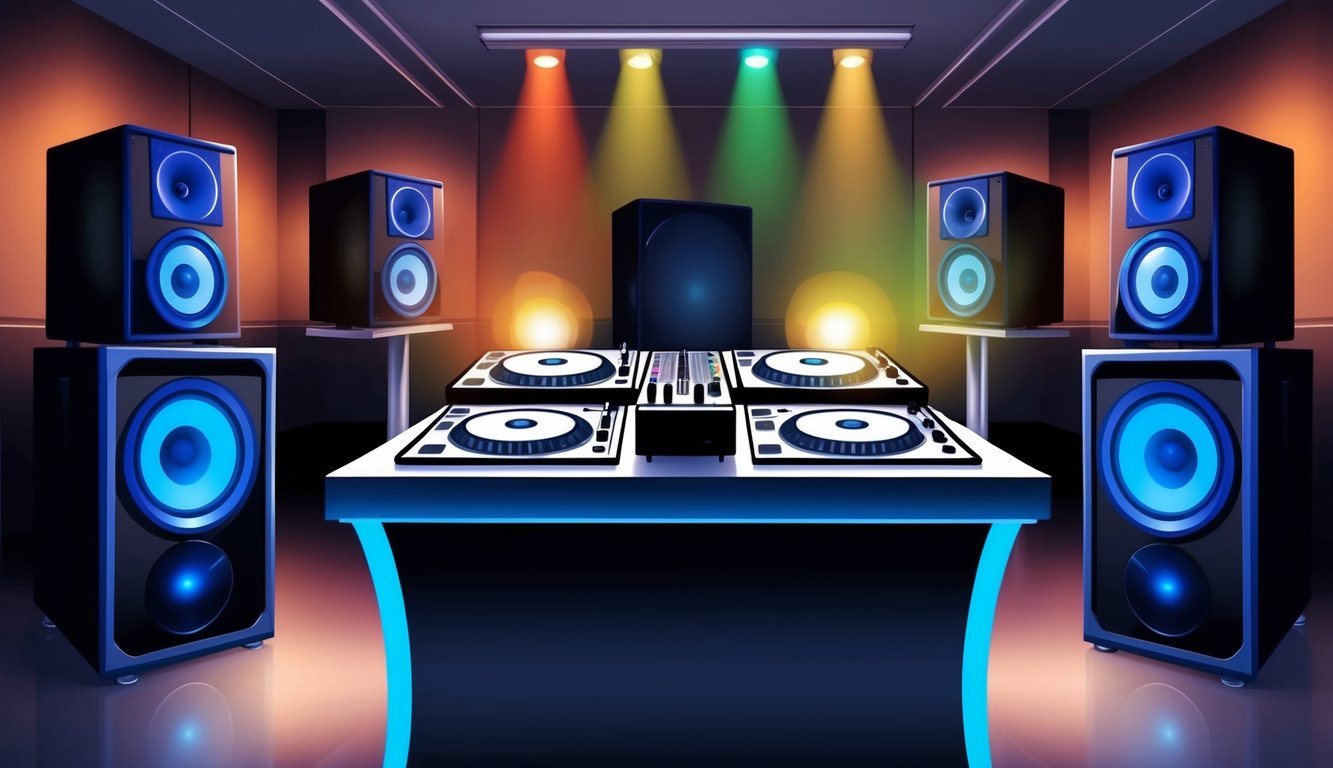
Launching your DJ side hustle requires careful planning and investment in the right tools.
You’ll need to decide on your equipment, software, and the types of services you’ll offer to stand out in the competitive DJ market.
Equipment and Software
To get started, you’ll need some essential gear.
Invest in a quality DJ controller, which allows you to mix and manipulate tracks.
Pair it with reliable headphones for precise cueing and monitoring.
Don’t forget about speakers – you might start with a basic PA system and upgrade later.
For software, consider popular options like Traktor or Serato.
These programs help you organize your music library and provide mixing features.
As you grow, you might add lighting equipment or a laptop stand to your setup.
Remember, your gear reflects your professionalism.
While you don’t need top-of-the-line equipment right away, aim for quality within your budget.
Business Model and Services Offered
Define your niche to stand out in the DJ market.
Are you focusing on weddings, corporate events, or club gigs? Each requires different skills and equipment.
Consider offering package deals.
For example:
- Basic: 4-hour event, standard sound system
- Premium: 6-hour event, enhanced lighting, MC services
Pricing is crucial.
Research local rates and set competitive prices that reflect your experience and equipment quality.
Don’t undervalue your services – remember, you’re not just playing music, you’re creating experiences.
Building an online presence is vital for attracting clients.
Create a website showcasing your services and past events.
Use social media to share mixes and engage with potential clients.
Building Online Presence
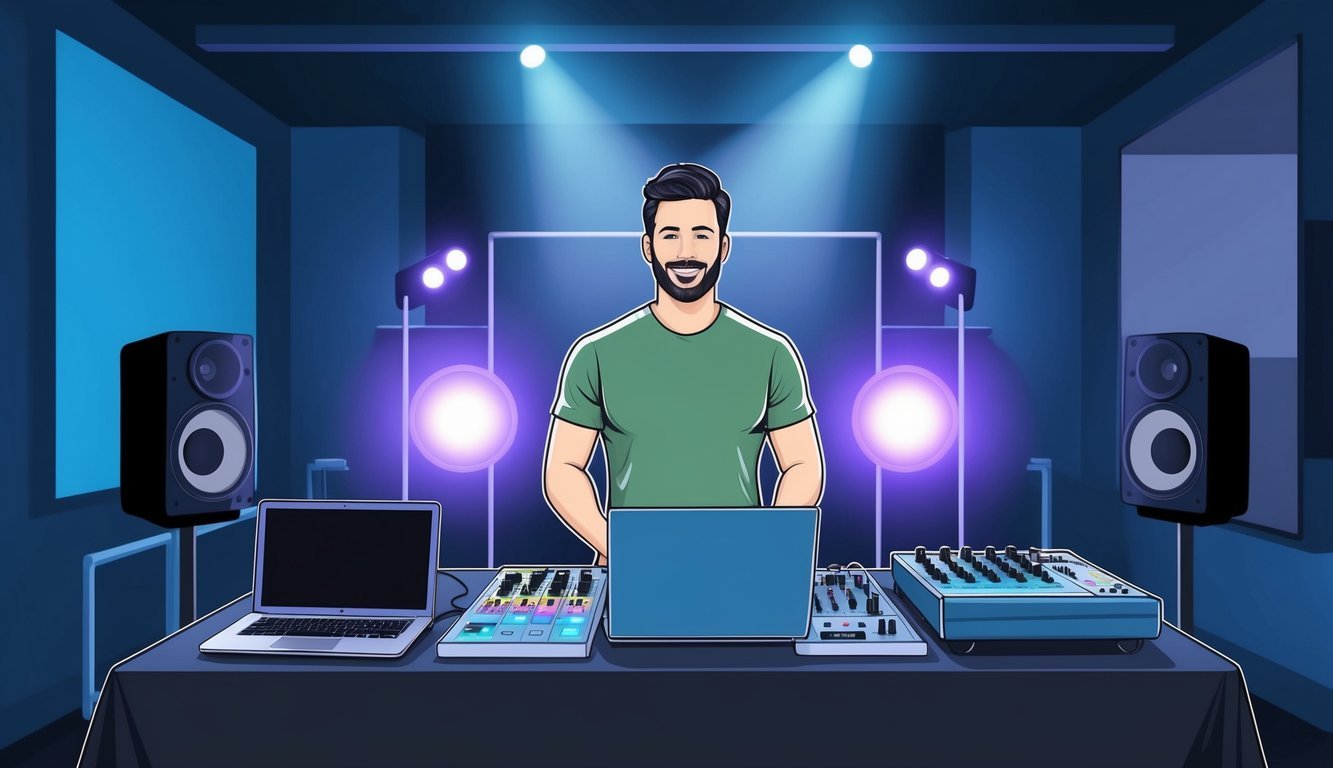
Creating a strong digital footprint is crucial for DJs looking to expand their reach and opportunities.
By leveraging social media and specialized platforms, you can showcase your skills and connect with potential clients and fans.
Creating Engaging Social Media Profiles
Start by choosing the right platforms for your DJ brand.
Instagram and TikTok are excellent for sharing short video clips of your mixes and performances.
Facebook is great for event promotion and connecting with local communities.
Consistency is key when it comes to your social media presence.
Post regularly and interact with your followers to build a loyal fanbase.
Share behind-the-scenes content, equipment setups, and snippets of your latest tracks to keep your audience engaged.
Don’t forget to use relevant hashtags to increase your visibility.
Research popular DJ-related hashtags and incorporate them into your posts.
This can help you reach a wider audience and connect with other professionals in the industry.
Utilizing Online Platforms for DJs
Beyond social media, there are specialized platforms designed for DJs to showcase their work and find gigs. Mixcloud and SoundCloud are great for uploading full-length mixes and original tracks.
These platforms allow you to build a portfolio that potential clients can easily access.
Consider creating a professional website to serve as your digital hub.
Include your biography, music samples, and a calendar of upcoming events.
This gives you a central place to direct potential clients and fans.
Networking is crucial in the DJ world.
Join online DJ communities and forums to connect with peers, share experiences, and learn about new opportunities.
These connections can lead to collaborations and gig referrals.
Marketing Your DJ Services
Promoting your DJ services effectively can make or break your side hustle.
Focus on building relationships and showcasing your unique style to stand out in a competitive industry.
Networking in the Music Scene
Start by attending local music events and introducing yourself to other DJs, promoters, and venue owners.
Be genuine and show interest in their work.
Exchange contact information and follow up with a friendly message.
Join online DJ communities and forums to connect with peers and potential clients.
Share your experiences, ask questions, and offer helpful advice to build your reputation.
Create a strong brand identity with a catchy DJ name and professional logo.
Design eye-catching business cards and hand them out at gigs and industry events.
Leverage social media platforms like Instagram and TikTok to showcase your skills.
Post short mix clips, behind-the-scenes content, and interact with your followers regularly.
Collaborating with Other Music Professionals
Team up with local musicians, producers, or other DJs for joint projects or events.
This can help you tap into new audiences and gain valuable experience.
Reach out to wedding planners, event coordinators, and party organizers.
Offer your services for their clients’ events and build lasting professional relationships.
Consider creating innovative content like podcast episodes or YouTube tutorials to establish yourself as an expert in your niche.
This can attract potential clients and collaborators.
Partner with local businesses for cross-promotion.
For example, team up with a music equipment store to host workshops or demo sessions, showcasing your skills while promoting their products.
Effective Event Planning
Planning an event as a DJ requires careful organization and attention to detail.
You’ll need to balance client needs with your musical expertise to create memorable experiences.
Client Consultations and Event Preparation
Start by meeting with your clients to understand their vision.
Ask about their preferred music genres, any must-play songs, and songs to avoid.
Discuss the event timeline and any special moments that need musical accompaniment.
Create a detailed checklist using tools like Asana to track tasks.
This helps you stay on top of equipment needs, venue requirements, and setup logistics.
For weddings, coordinate with other vendors to ensure smooth transitions.
At corporate events, familiarize yourself with the company culture and any specific requests.
Always have a backup plan.
Pack extra cables, a spare laptop, and backup music files.
Arrive early to set up and test your equipment thoroughly.
Music Playlist Curation
Crafting the perfect playlist is crucial for your event’s success.
Start by creating a master list of songs that fit the event’s theme and your client’s preferences.
Use music streaming platforms to discover new tracks and remixes.
Organize your playlists by mood, tempo, or genre to easily switch between styles during the event.
For weddings, include classic love songs and current hits.
Corporate events often require a mix of background music and dance floor fillers.
Pay attention to the flow of your playlist.
Transition smoothly between songs and gradually build energy throughout the night.
Be prepared to take requests, but maintain control of the overall vibe.
Remember to respect copyright laws and ensure you have the necessary licenses to play music publicly.
Honing Your Music and Mixing Skills
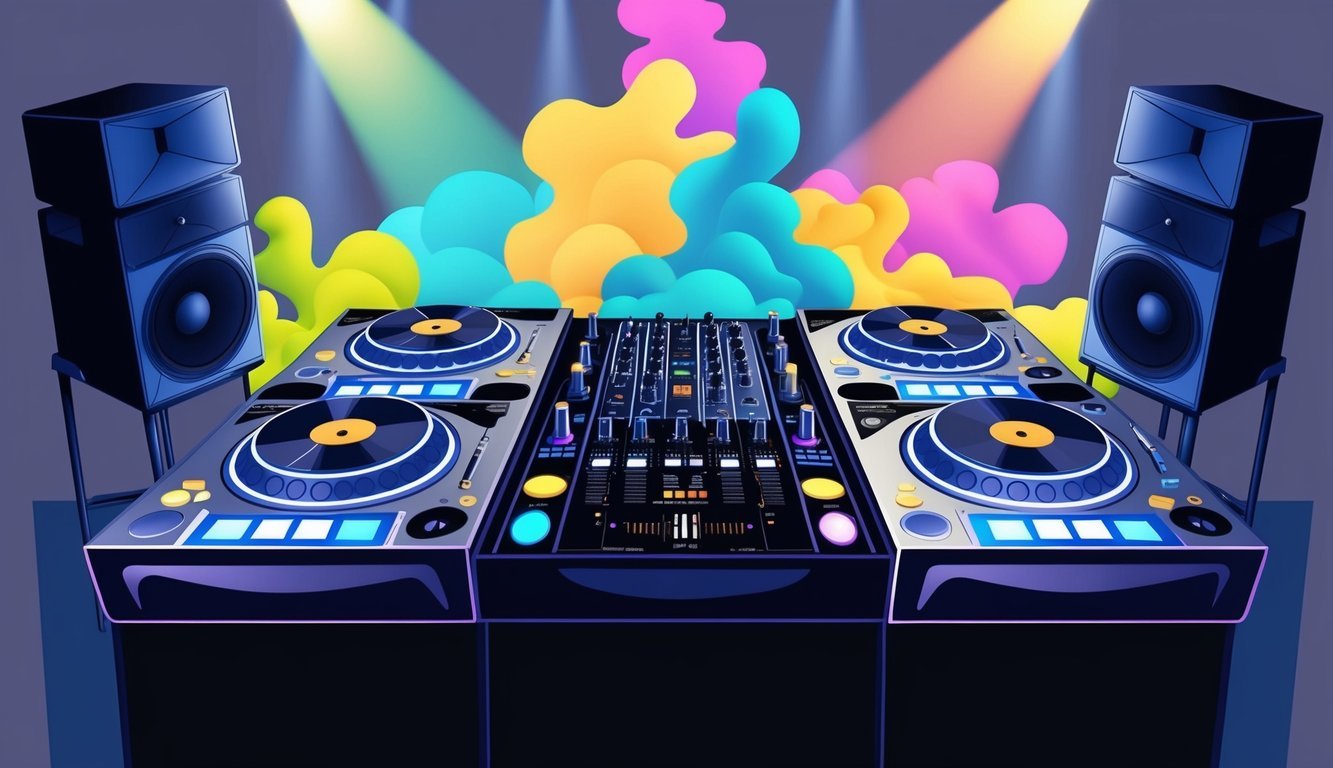
Developing your skills as a DJ requires continuous learning and practice.
You’ll need to expand your musical horizons and master advanced mixing techniques to create a unique sound that sets you apart.
Expanding Your Music Knowledge
Start by diving deep into different genres and eras of music.
Listen to a wide variety of tracks, from classic hits to underground gems.
Create playlists for different moods and occasions to broaden your repertoire.
Attend live music events and concerts to experience how professional artists engage with audiences.
This will help you understand crowd dynamics and energy flow.
Stay updated on new music releases and trending tracks.
Follow music blogs, podcasts, and industry news to keep your finger on the pulse of the music scene.
Network with other DJs and musicians.
Join online forums or local DJ communities to exchange ideas and discover new tracks.
Collaboration can lead to fresh perspectives and innovative mixes.
Advanced Mixing Techniques and Tricks
Master the art of beatmatching and practice different mixing techniques like EQ mixing, harmonic mixing, and looping.
Experiment with effects and filters to create unique transitions and buildups.
Invest time in learning your DJ software inside out.
Whether you use Serato, Traktor, or Rekordbox, knowing all the features will help you mix more efficiently and creatively.
Try remixing popular tracks or creating your own edits.
This will help you develop a signature style and stand out from other DJs.
Don’t be afraid to experiment with unexpected genre combinations.
Practice reading the crowd and adjusting your set on the fly.
Learn to seamlessly switch between different energy levels and moods to keep your audience engaged throughout your performance.
Scoring DJ Gigs
Landing DJ gigs requires a mix of networking, marketing, and showcasing your skills.
You’ll find opportunities ranging from intimate private events to large-scale music festivals.
Each venue type offers unique experiences and challenges for aspiring DJs.
Weddings and Private Events
Private events can be a goldmine for DJs looking to build their reputation and income.
Weddings, birthdays, and corporate functions often seek talented DJs to keep the party going.
To score these gigs, start by creating a professional portfolio showcasing your mixing skills and song selection.
Network with event planners and venue owners in your area.
They can be valuable connections for securing regular bookings.
Consider offering special packages for different types of events to attract more clients.
Don’t underestimate the power of word-of-mouth.
Deliver exceptional performances, and you’ll likely get referrals for future events.
Remember to be flexible with your music choices, as private events often require a diverse playlist to cater to various age groups and preferences.
Festivals and Live Performance Opportunities
Music festivals and live gigs offer exciting platforms to showcase your DJ skills to larger audiences.
Start by researching local festivals and venues that host electronic music events.
Many have open applications for up-and-coming DJs.
Create a compelling press kit with your best mixes, bio, and social media links.
Submit this to festival organizers and booking agents.
Don’t be discouraged if you don’t hear back immediately – persistence is key in this industry.
Consider collaborating with other DJs or producers.
Joint performances can help you access new fan bases and potentially larger events.
Platforms like gigmit and Indie on the Move list DJ opportunities for various venues and events.
Engage with your local music scene by attending gigs and networking with other artists.
Building relationships within the industry can lead to unexpected opportunities and valuable mentorship.
Financial Management for DJs
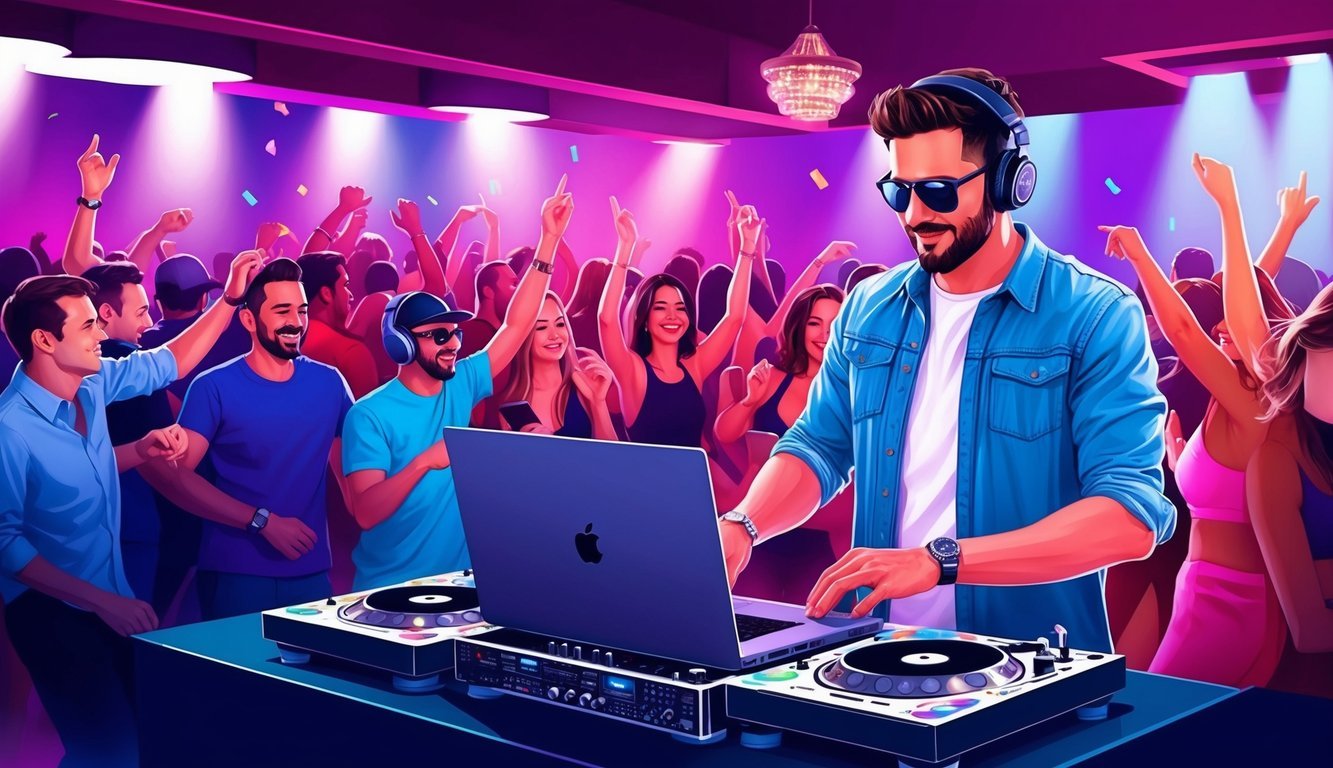
Managing your finances effectively is crucial for a successful DJ side hustle.
You’ll need to balance equipment investments with income generation and explore ways to diversify your revenue streams.
Budgeting for Music Equipment
As a DJ, you’ll need to invest in quality gear to deliver top-notch performances.
Start by creating a budget for essential equipment like turntables, mixers, and speakers.
Consider leasing or renting equipment initially to minimize upfront costs.
This allows you to test different setups before committing to purchases.
Set aside a portion of your earnings for equipment upgrades and maintenance.
Aim to save 10-15% of your income for this purpose.
Don’t forget to factor in software costs for digital DJing.
Many professional DJ applications offer monthly subscription plans, making it easier to budget.
Prioritize your spending on equipment that directly impacts your performance quality.
Invest in reliable, versatile gear that can handle various gig types.
Creating Passive Income Streams
Diversifying your income as a DJ can provide financial stability and growth opportunities.
Look beyond live performances to build passive revenue streams.
Consider creating and selling DJ mixes or playlists on platforms like Beatport or Bandcamp.
This allows you to earn money while you sleep.
Offer online DJ courses or tutorials.
Share your expertise through video lessons or e-books, creating a steady income source.
Explore music production and licensing.
Creating original tracks or remixes can lead to royalties from streaming platforms and sync licensing deals.
Develop a strong online presence to attract sponsorships or brand partnerships.
This can result in product endorsements or affiliate marketing opportunities.
Consider starting a DJ-related YouTube channel or podcast.
Ad revenue and sponsorships can provide additional passive income as your audience grows.
Learning from the Best
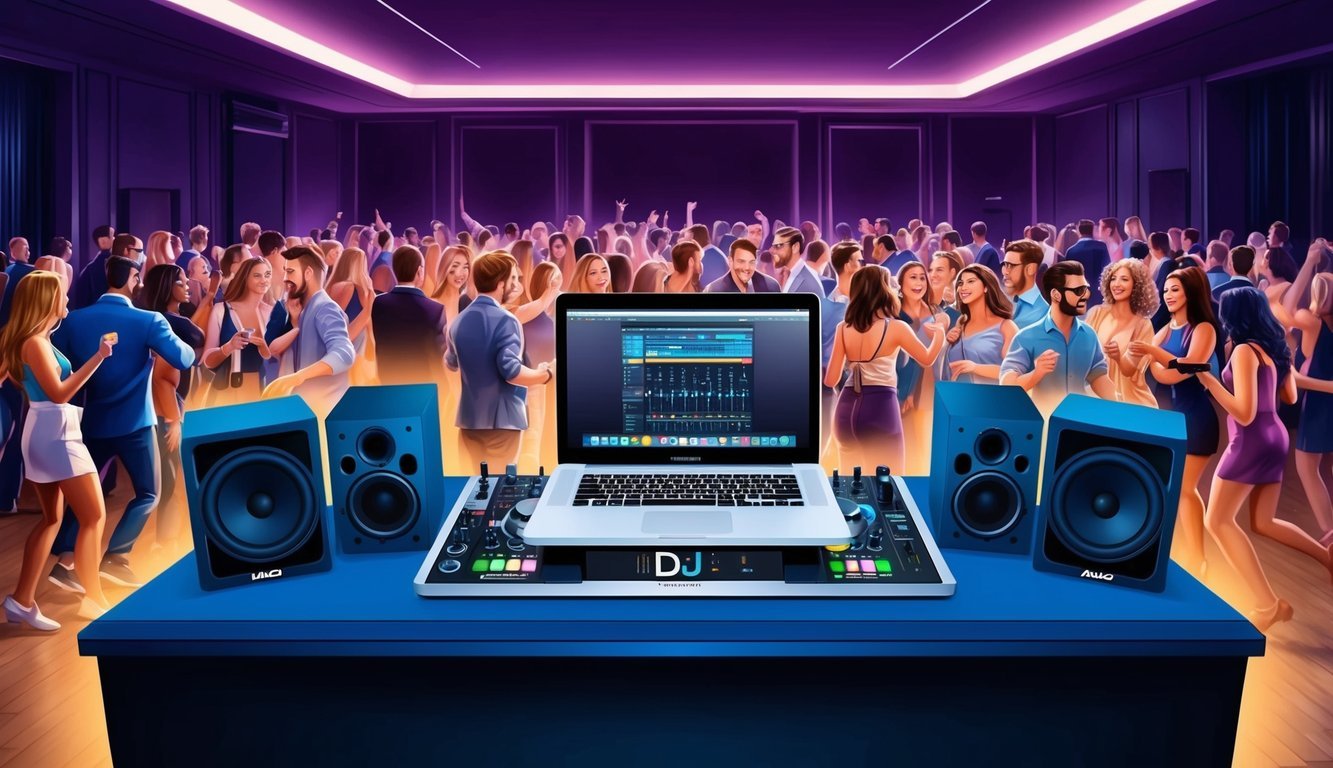
Tapping into the wisdom of experienced DJs can fast-track your journey in the event DJ side hustle.
You’ll gain valuable insights and avoid common pitfalls by learning from those who’ve paved the way.
The Role of a Mentor
Finding a mentor can be a game-changer for your DJ career.
Look for established DJs in your area who might be willing to take you under their wing.
A good mentor can teach you the ropes of mixing tracks and reading crowds.
Don’t be shy about reaching out.
Many seasoned DJs are happy to share their knowledge.
Your mentor can help you:
- Perfect your techniques
- Understand equipment setup
- Navigate the business side of DJing
Remember, mentorship is a two-way street.
Be respectful of your mentor’s time and show enthusiasm for learning.
Life Lessons from Experienced DJs
Veteran DJs, especially those from radio, have a wealth of knowledge to share.
They’ve likely faced every challenge you can imagine.
By listening to their stories, you can learn how to:
- Handle difficult clients
- Recover from technical glitches
- Build a loyal fan base
Radio DJs often have great advice on song selection and audience engagement.
They know how to keep the energy high and the dance floor packed.
Use DJing as a creative outlet, but also learn the business aspects.
Experienced DJs can teach you about:
- Marketing yourself
- Setting fair rates
- Networking in the industry
Maintaining a Healthy Work-Life Balance
Balancing your DJ side hustle with your regular job and personal life requires careful planning and self-awareness.
Effective time management and nurturing your passion are key to sustaining your energy and creativity.
Productivity Hacks for Busy DJs
Block out dedicated time for your DJ activities.
Use a digital calendar to schedule gigs, practice sessions, and music discovery.
Batch similar tasks together.
Set aside specific hours for playlist curation, equipment maintenance, and social media updates.
Leverage technology to streamline your workflow.
Use DJ software to organize your music library and create playlists on the go.
Check in with yourself regularly.
If you’re feeling overwhelmed, it’s okay to take a step back and reassess your commitments.
Consider outsourcing non-essential tasks.
Hiring a virtual assistant for bookings or social media management can free up your time for creative work.
Passion and Profession
Your DJ side hustle can be both a creative outlet and a source of passive income.
Explore opportunities to monetize your skills beyond live gigs, such as creating and selling sample packs or offering online DJ lessons.
Remember why you started DJing.
Set aside time to experiment with new tracks and techniques just for fun, without the pressure of performing.
Involve your family and friends in your DJ journey.
They can provide emotional support and even help with tasks like event promotion or equipment setup.
Network with other DJs to share experiences and tips.
Building a supportive community can make your side hustle more enjoyable and sustainable.
Frequently Asked Questions
Starting a DJ side hustle raises many common questions about equipment, rates, and balancing it with other commitments.
Here are answers to some key questions to help you launch your event DJ business.
What do I need to get started as an event DJ?
You’ll need some basic equipment to get started.
This includes a laptop with DJ software, headphones, and a DJ controller.
Many beginners use entry-level controllers that are more affordable.
You’ll also want to build a diverse music library and invest in some basic marketing materials like business cards.
What’s the going rate for event DJs these days?
Rates vary widely depending on your location, experience, and the type of event.
As a beginner, you might charge $50-100 per hour.
More experienced DJs can command $150-300+ per hour for weddings and corporate events.
Always research local rates to stay competitive.
Are there any creative ways to make my DJ gigs stand out?
Absolutely! Consider offering unique services like custom playlists tailored to the event theme.
You could also incorporate live elements, such as percussion or a saxophone player.
Visuals and lighting can also set you apart, creating a more immersive experience for guests.
What kind of equipment should I invest in for starting my DJ side gig?
Start with the essentials: a reliable laptop, DJ software, and a controller.
Quality headphones are crucial for cueing tracks.
As you progress, consider investing in powered speakers, a mixer, and perhaps some basic lighting equipment.
Gradually upgrade as your business grows.
How can I balance my day job with DJing on the side?
Time management is key.
Set aside specific hours for DJ prep and marketing.
Limit your gigs to weekends or evenings at first.
Use digital tools to streamline your workflow, like scheduling software for bookings.
Be realistic about how many gigs you can handle without burning out.
What’s the best way to land my first DJ gig?
Networking is crucial.
Tell your friends and family about your new venture.
Create social media accounts to showcase your skills.
Offer to DJ for free at small local events to gain experience and referrals.
Consider partnering with event planners or venues to get your foot in the door.


